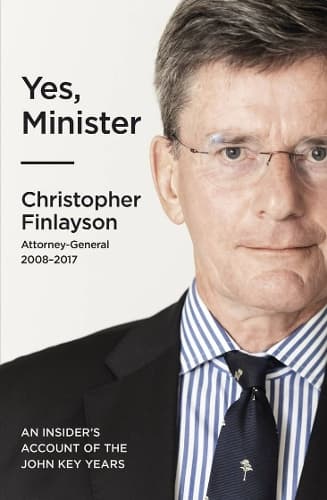Review: Yes, Minister: An Insider’s Account of the John Key Years
Reviewed by primoz2500
Reviewed by: David Herkt.
Author:Chris Finlayson
Publisher:Allen & Unwin New Zealand
ISBN:9781991006103
Date Published:16 August 2022
Pages:272
Format:Paperback
RRP:$36.99
All books bought via this link help us to review more books from Aotearoa — thank you for supporting local books and authors
“A riddle wrapped in a mystery inside an enigma,” seems a particularly apt phrase in the case of the former Cabinet Minister, Chris Finlayson. Originally used by Winston Churchill to describe the Soviet Union in October 1939 after that nation signed its quixotic Non-Aggression Pact with Nazi Germany, it seems tailor-made for Finlayson: Catholic, a lawyer, homosexual, avowed celibate, unashamed conservative, lover of the high arts, holder of several National Party ministries, and the forthright New Zealand Attorney-General, 2008 – 2017.
Finlayson’s recent memoir, Yes, Minister: An Insider’s Account of the John Key Years, is similarly contradictory. Often it seems a very professional piece of legerdemain, a successful slight-of-hand, which almost believably proclaims “Nothing to see here, move on, move on…” But an occasional exceptionally revealing anecdote and – most particularly – a very pointed omission or two quickly indicates to the reader exactly what is being brushed under the carpet.
So, anyone expecting an explicit exposé from the heart of the John Key Government will not find it. This is a great pity, as can be easily imagined from the length of Finlayson’s career and the positions he occupied. Here is a man who knew the political figures and the background to many of the formative moments in New Zealand’s recent history. Finlayson, however, is a professional keeper of secrets and while there is occasional dish, there is seldom dirt. He was, after all, amidst many other ministerial positions, in charge of both the Government Communications Security Bureau (GCSB) and the New Zealand Security Intelligence Service (NZSIS).
As those who have encountered him in his latter role as a regular Radio New Zealand afternoon panel guest and as an interviewee on matters of the moment will know, Finlayson can be engaging, droll, dry, opinionated and frequently very funny indeed – when he wants to be. Yes, Minister preserves some of that character. He is feisty.
There is an unashamed section where the Catholic Finlayson goes into battle against some ‘gimmicky’ nonsense from his own church (‘I neither want nor need a lecture from you on Catholic social justice,’ he writes to the Diocese of Auckland.) Then reading between the lines of any of Finlayson’s comments on Paula Bennett is to discover a barely concealed loathing and the record of his background moves against her assuming any real leadership role in the National Party speaks for itself. The most a reader will find on the reasoning behind the pair’s bad relationship, however, is that Finlayson ‘had no respect for her.’
More explicitly, we receive his opinions on Amy Adams who had just returned to Parliament after a speaker’s overseas tour with an extended holiday tacked on – and this after the decimation of the National Party in the 2017 election. Adams came up to Finlayson and said, ‘Oh, are you still here?’ Finlayson responded by saying that a lot of people were asking the same about her, adding that many people thought she had been derelict in her duty: ‘Normally, I would not respond so bluntly, but Amy is not a person who understands subtlety.’
Finlayson’s loyalty to former Prime Minister, John Key is written large. He also has a long memory, recalling the fact the National Cycleway, that project much derided by the contemporary Right, was in fact one of Key’s favoured initiatives. There are also numbers of surprising figures for whom he expresses admiration, respect or fondness. This notably includes Tariana Turia, Andrew Little and Annette King. His biggest mistake, he avers, was his support for Simon Bridges as the National Party leader in 2018.
Finlayson’s account of his last years in the party following their electoral loss makes rueful reading and is a fascinating analysis. His point-form prescription to rectify problems in the party should be compulsory reading for any National member. ‘The Board must vet candidates properly before they are permitted to run,’ Finlayson writes somehow presciently.
For someone so intimately involved with the fraught area of Treaty Settlements, there is one achievement that cannot be taken from Finlayson; he concluded more than 70 land settlement deals with iwi. Finlayson’s record of these negotiations has been covered in his co-written and more complex book, He Kupu Taurangi: Treaty Settlements and the Future of Aotearoa New Zealand, but Yes, Minister adds a more personal layering.
Finlayson’s support for the increased teaching of New Zealand history in schools should be noted, especially his emphasis that the Whanganui, Te Urewera and Parihaka agreements need to be fully understood by all, as does his opinion that any future history curriculum should not be a “one-sided propagandist approach.”
Finlayson, in his concluding pages, refers to Yes, Minister as a ‘sketch’ which indeed it is. A reader gets tantalising glimpses of what could have been – even allowing for the legal vetting of the book. As is indicated by Finlayson’s other media appearances, his interviews and his writings, Yes, Minister could have easily been more – more personal, more politically telling. Still, it is valuable in many ways, not the least to foreground the tides of government and political parties which, after all, are made up of people of varying abilities as their presence and power fluctuates at the will of the electorate.
Reviewed by David Herkt
